|
|
|
 |
|
"SAUL AND JONATHAN, LOVED AND LOVELY;
IN THEIR LIVES, EVEN IN THEIR DEATHS, THEY WERE NOT DIVIDED.
SWIFTER THAN EAGLES WERE THEY; STRONGER THAN LIONS”
SECOND Samuel
1: 23
|
|
|
 |
|
 |
Tall, dark and handsome, Saul, son of Kish
(pronounced quiche) looked like a king.
While searching for his dad’s lost donkeys,
Saul found a kingdom when he was secretly
anointed by Samuel the Prophet.
If you remember, throughout the period of
the Judges, each person did what was right
in his own eyes and there was utter chaos.
When Samuel the Prophet grew old, the elders
of Israel assembled at Ramah and begged him
to appoint a king to rule over them and
establish order.
Samuel solemnly warned them that the king
would take the best of their fields,
vineyards and olive groves. He would draft
their sons to run in front of his chariots.
Their daughters would become his perfumers,
bakers and perhaps even his concubines.
But the people insisted they needed a king
so that they could be like other nations.
And they needed a king to fight their
battles.
We know from First Samuel chapter 11 that in
the beginning kingship was only a part-time
job. Saul remained a farmer. In the
meantime, over across the River Jordan to
the east where the tribes of Gad and Reuben
had settled, Nahash, (meaning snake!) the
king of Amman, besieged the town of Jabesh
Gilead. Desperate, the men of Jabesh
offered to surrender and serve Nahash. |
|
|
 |
|
Photo:
Gila Yudkin |
|
View of Tel Beth Shean from
the Greek-Roman Decapolis city, Scythopolis |
|
But the snake of Amman offered to spare
their lives on one condition only. That was
if each man of fighting age volunteered to
have his right eye gouged out. (Ouch!!) This
was the ultimate way not only to humiliate
them, but to render them defenseless.
The right eye, for most people, is the
“shooting” eye, i.e. the eye that aims and
hits the target. The people of Jabesh
Gilead pleaded for time to weigh their
decision and Nahash agreed to a ceasefire of
seven days.
They urgently sent out an SOS to all the
tribes of Israel. Saul had just
returned from plowing his fields when he
heard the plea of Jabesh-Gilead. A
mighty spirit fell upon a furious Saul.
He slaughtered the pair of oxen he had been
driving and divided them up into 12 pieces.
He sent one to each tribe with a twitter,
“This is what will happen to your livestock
if you do not march with Saul to rescue the
people of Jabesh Gilead!”
Saul defeated Nahash and the people of
Jabesh Gilead returned to business as usual.
Saul then went on to become a full-time king
and in the process, managed to lose the
support of Samuel and invoked the anger of
the Almighty. |
|
|
If we fast forward forty years, Saul could
be found in the eastern end of the Jezreel
Valley, facing the Philistines by Mount
Gilboa. Both nations coveted control
of the lucrative trade-route passing by Beth
Shean which crosses the River Jordan and
then heads north towards Damascus. |
|
|
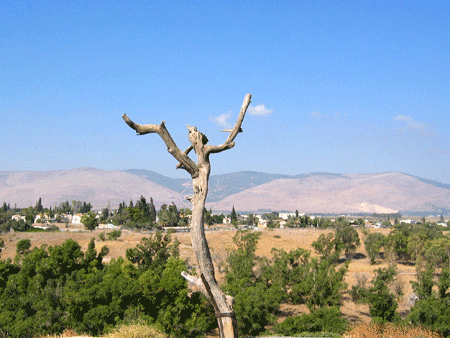 |
|
Photo:
Gila Yudkin |
|
From the tel, looking at
Mount Gilboa |
|
|
Filled with fear at the sight of the massive
Philistine army, Saul prayed for a sign or a
dream or a prophet to forecast the outcome
of the battle. But his channel to the
Almighty was blocked. |
|
By cover of darkness, Saul sought out the
witch of Ein Dor who brought Samuel the
Prophet up from the dead. At the
séance, Samuel waved a long, crooked finger
at Saul and protested, “Why are you hassling
me?” Saul pleaded with great distress,
“The Lord has departed from me and does not
answer me either by dreams or by prophets.
Tell me, what should I do?” (First Samuel
28:15) “Tomorrow you and your sons
will be with me!” retorted Samuel. At
these words Saul fainted.
We’ll leave Saul, king of Israel, lying
full-length on the ground for now and keep
you
in suspense as to Saul’s dramatic climax
until we visit Beth Shean together,
hopefully in the not-too-distant future.
I’ve found the best place to analyze Saul’s
resume is either in the theater of Beth
Shean or from the summit of the tel (that
is, if we have a group with young athletic
legs) where we can actually see the
mud-brick tower of the 11th century BC wall
where the bodies of Saul and his sons may
have been hanging. |
|
|
 |
|
Photo:
Gila Yudkin |
|
To the left is the
mud-brick tower in the wall dated to the
11th century BC |
|
|
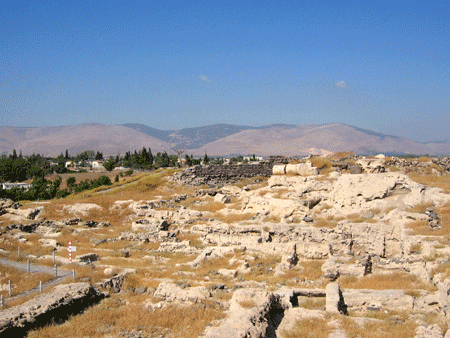 |
|
Photo:
Gila Yudkin |
|
View of ancient ruins on
Tel Beth Shean |
|
|
|
Saul’s dramatic end is accompanied by a
surprisingly funky cast of characters: a
warm-hearted witch, an outraged dead
prophet, a contemptuous enemy, an ally with
a staunch long-term memory and a distraught
anointed successor. |
|
|
Come with me to Beth Shean and we will
lament Saul, first king of Israel, with one
of the most moving eulogies ever composed in
any language. “Your glory, O Israel
lies slain on your heights, how are the
mighty fallen.” |
|
|
|
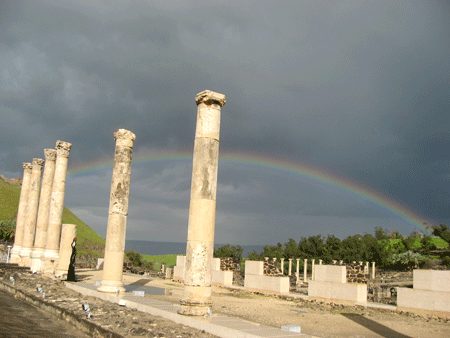 |
|
Photo:
Gila Yudkin |
|
Rainbow over Beth Shean,
March 2011 |
|
|
Copyright 2010, 2011 Gila Yudkin. Permission
needed for any reuse. |
|
|
|
Gila Yudkin,
who calls herself a Connecticut-born Yankee
living in King David’s court, is always
updating herself and her groups with the
latest biblical archeological discoveries.
In the City of David, where there’s
controversy galore, ask Gila to show you
part of the 120-foot long tenth century BC
wall, reputed to be of David’s palace. With
Gila’s creative commentary, you will be
straining your neck to catch a glimpse of
Bathsheba! |
|
|
|
For 50 shekels of silver, David bought Mount
Moriah, the threshing floor of Araunah.
Tour the Temple Mount
with Gila, in the company of David and
Solomon, Abraham and Isaac, Jesus and the
disciples, Gabriel and Mohammed. |
|
|
| |
|
More
Biblical Archeology: |
|
|
|
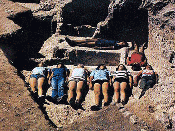 |
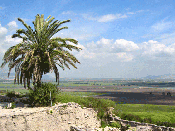 |
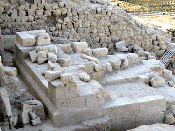 |
|
Priestly Benediction |
Armageddon/ Megiddo |
Herod's Tomb found! |
|
|
|
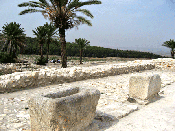 |
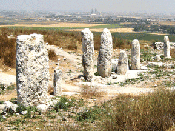 |
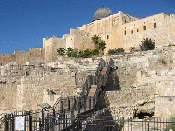 |
|
Solomon's stables:
Megiddo |
Solomon's dowry:
Gezer |
Jerusalem: Solomon's
digs |
| |
|
|
|
|
|
|
|
GILA
YUDKIN
•
TCHERNIKOVSKI
64A
•
JERUSALEM
•
ISRAEL
gila@itsgila.com
HOME
•
BOOK
GILA •
TIPS
FOR TOURS •
ABOUT GILA
|
|

